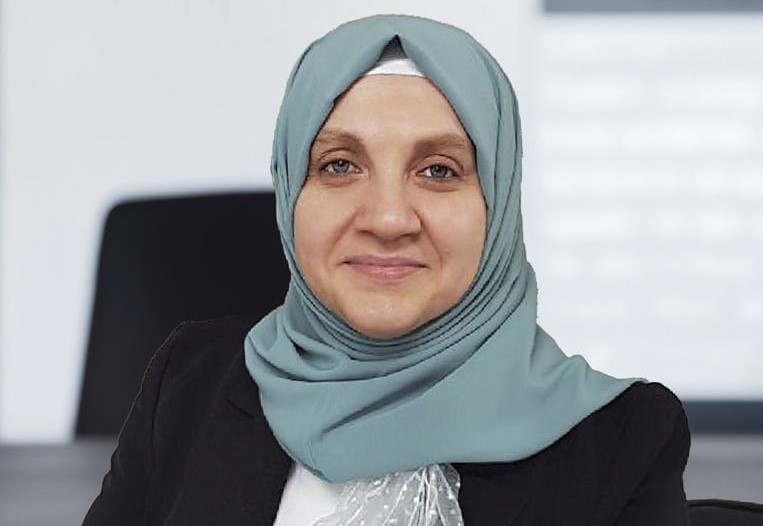Aisha al-Dibs, head of the Women’s Affairs Office in the Syrian caretaker government, responded to criticism directed at her on social media regarding her recent statements about her vision for the role and status of Syrian women in the coming phase. In a post on the X platform on Saturday, she said she and other Syrian women are striving to “create a unique model of proactive, constructive, and giving Syrian women.” She added, “We will not burden ourselves with experiments that do not suit us or ready-made molds that do not meet our needs or achieve our goals. Together, we will create our own model, based on our beliefs, civilization, history, and diversity.”
Aisha al-Dibs stirred controversy on social media following her remarks on the Arabic-language Turkish channel “TRT,” where she said the new administration aims to “create a model suited to the reality and circumstances of Syrian women,” noting that Islamic Sharia law would serve as the foundation for any model without adopting ready-made or imported frameworks.
She expressed her rejection of any external support that conflicts with the model the new administration is working to develop. She emphasized, “I will not allow space for those who differ with me ideologically. We have previously suffered from training programs by foreign organizations that harmed our children and women,” claiming these programs led to increased divorce rates in society. She further stated that women are “primarily responsible for their families, husbands, and priorities.”
A Modern and Democratic State
Critics argued that Dibs disregarded the role and sacrifices of Syrian women during the years of war and revolution, as well as the contributions of Syrian feminist organizations. Journalist Rula Haidar wrote on Facebook: “There is a mix-up regarding the responsibilities Aisha should be handling as an official in the caretaker government, and the rights and duties of women, which will be determined by the people through the constitution! Your role is an urgent and rescue-focused one addressing the current situation of women during the remaining term of this government! Surely, a rescue role does not involve what you discussed in this interview! Have you counted the number of released female detainees and assessed their daily life, psychological, health, and social needs after their release?”
Syrian writer Mai al-Rahbi was surprised by Aisha al-Dibs’ discussion of building a unique governance model for Syria, asserting that any state must be based on international charters, primarily the Universal Declaration of Human Rights. She argued that it is impossible to gain assistance from international humanitarian organizations, as Dibs demands, without presenting a bright image of a modern democratic state founded on equal citizenship, free from discrimination among its people.
Syrian Activists Outraged Over Obaida Arnaout’s Remarks on Women’s Role in Future Syria
She likened Dibs’ call for Syrian women to dialogue exclusively under the framework of her proposed model to the practices of the previous regime, which excluded any women’s association or organization that did not align with its model. She also criticized Dibs for stating that the model would be based on Islamic Sharia, disregarding other religions and sects.
Activist Jihad al-Hourani commented: “After watching Dr. Aisha al-Dibs’ full interview with TRT Arabic, (Ahmad) al-Sharaa urgently needs to convene a national conference to form a transitional government to address the crisis of appointments. Quite frankly, Dr. Aisha al-Dibs is not suitable for the task assigned to her and lacks the necessary experience to deal with a diverse society like Syria.”
Meanwhile, journalist Dima Azeddine argued that there has been an exaggeration of the attention given to this statement while neglecting more important issues.
Academic Ahmad Ali Omar noted that “women’s issues are sensitive and contentious, and no Syrian woman can say something about Syrian women that would satisfy every Syrian woman or any group of them.”
On December 20th, the Political Affairs Administration in Syria announced in an official statement the appointment of Aisha al-Dibs as head of its Women’s Affairs Office. She is tasked with communication on legal, social, cultural, and political issues related to Syrian women.
Aisha al-Dibs hails from Damascus and holds a master’s degree in business administration from the University of Damascus. She describes herself as “an activist in women’s development and the promotion of civic and humanitarian work.” She recently moved from Istanbul to the capital, Damascus, on December 14, describing it as “after 14 years of struggle and exile,” according to her Facebook post.
This article was translated and edited by The Syrian Observer. The Syrian Observer has not verified the content of this story. Responsibility for the information and views set out in this article lies entirely with the author.


